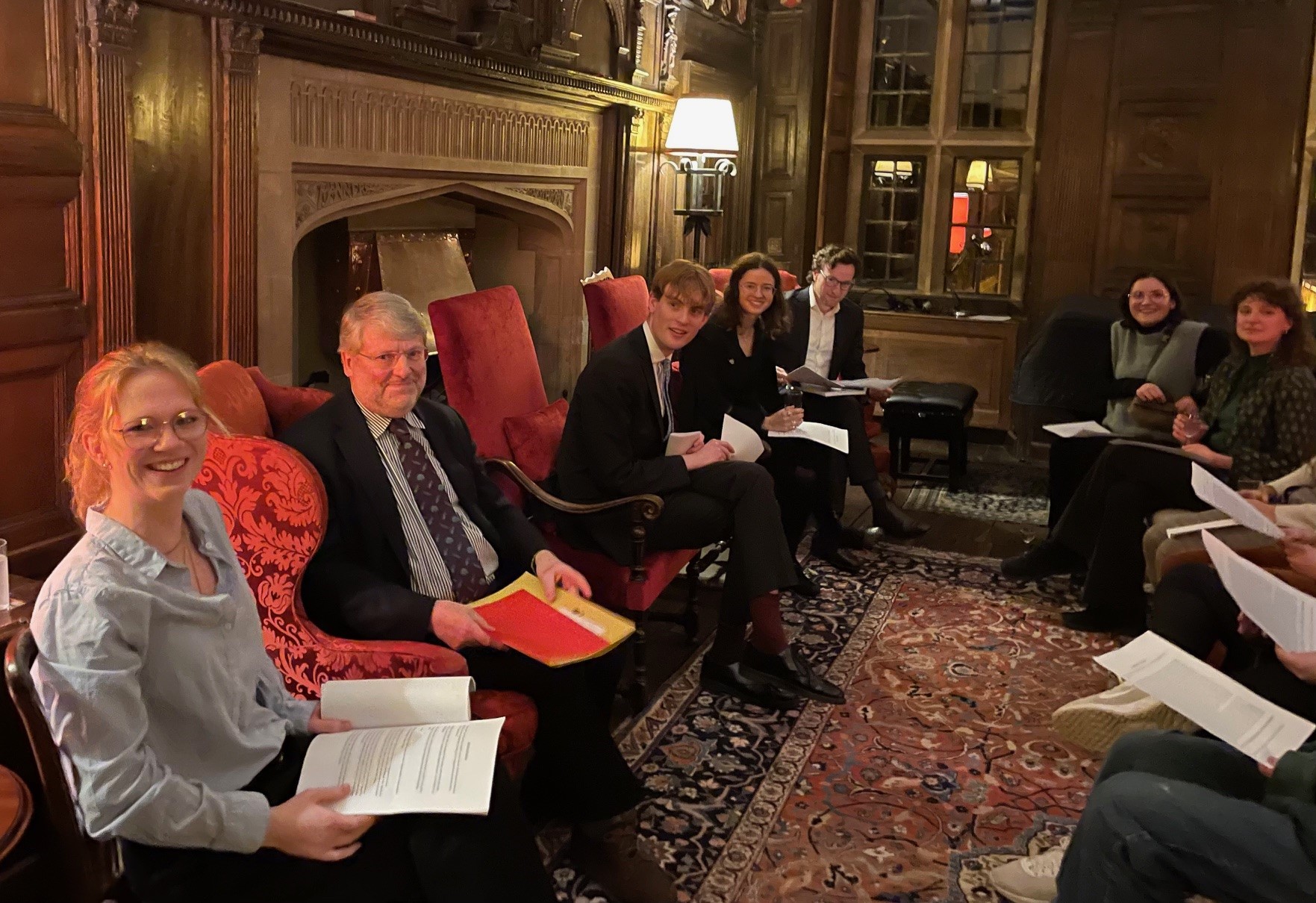New College Essay Society Meeting - Hilary Term 2024
On Monday, New College Essay Society met to discuss "The Enlightenment: Reason and Public Opinion".
Professor Nicholas Cronk (Professor of French Literature at St Edmund Hall and Director of the Voltaire Foundation) presented a wholeheartedly optimistic definition of "the Enlightenment" from Isaiah Berlin and challenging its triumphalism from roughly three different angles. First, some of the crucial works on the Enlightenment from the 20th century were borne out of fascist crisis. As such, "the Enlightenment" should not be read as some grand moment, but instead always seems to come to the fore as Europe reassesses itself against threats to liberal values. Second, the Enlightenment itself was facilitated by a trade boom which relied upon colonialisation and the global slave trade, and Enlightenment scholars have generally not given enough attention to this. Finally, in situating the Enlightenment within the context of the so-called "print revolution", we can see that it was in fact not the Enlightenment ideas themselves, but rather the way in which the ideas were circulated, that made the period distinctive.
Students were then invited to speak on the topic:
Josephine Krupa (JCR)
We often discuss the Enlightenment and the role of reason in Enlightenment thought, but have you ever wondered what it actually means to be “enlightened” and to have “reason”? Like philosophical thought and History, language itself evolves through time, taking on many (and oftentimes contradictory) definitions. Why did ‘enlightenment,’ an essentially religious and spiritual idea, come to represent all thought that is not religious? What does the paradox between its literal and figurative definitions, which radically differ in the idea of autonomy and self-sufficiency, imply about the concept of reason and the role of malleable definitions in changing public opinion?
Patrick Maxwell (JCR)
I will be speaking on the role that music and historical ideas about music have to do with the growth of reason and the Enlightenment in Europe. While musical history illuminates and deepens an understanding of many of the currents running through the development of rational systems in the West, and while 'art music' has found a place in the hearts of the middle-class and the educated often associated as the products of the Enlightenment, the relationship is more complex. I'll be asking whether music has replaced religion as a means of transferring society's irrational feelings since the late eighteenth century, and what that means for our perceptions of the 'growth of reason'.
Patrick Flood (MCR)
Enlightenment ideas were not just spread through the solitary contemplation of individuals but in the chaos of conversations, debates, and, perhaps, diplomacy. In this essay, I will discuss the relationship between the Scottish Enlightenment and a network of diplomats, focussing particularly on the role of Robert Liston (1742-1836). Using recent research from an archival trip in December 2023 to the National Library of Scotland in Edinburgh, I will introduce Liston as a key “node” in a wider network of Scottish emissaries who acted as conduits of objects of interest for a circle of Edinburgh literati, all members of the Royal Society of Edinburgh. Here Liston transported minerals, manuscripts, and plant samples. Yet, he also introduced scientific experiments and “Enlightenment discussions” as a means of a broader diplomatic approach across the courts at Philadelphia, Berlin, Munich, Turin, Stockholm, and Constantinople.
Report by Sophie Jones, Chair of the New College Essay Society

What is New College Essay Society?
Since its foundation in 1868, the Society has been a place for New College students to discuss topics of interest outside of their courses of study – it is said to perhaps be the oldest existing society of its type in college. Our session this term will be the 1203rd meeting of the Society.
Our New College archivist, Michael Stansfield, has handed some fascinating information over to us on the society’s history; in its early days, the society had a very detailed list of rules, such as one from 1871 which stated that smoking was only to be permitted during meetings after the essays had been read. The Society has had a wide range of discussions, ranging from “Bull Fighting”, to “Thou shalt not kill”. A title we found particularly interesting from one of the earliest meetings debated the value of women receiving an education.
The society met continuously from its foundation through to 1963 aside from a brief pause during the first world war and was revived a few years ago. Illustrious names fill the group’s history, such as Tony Benn, Isaiah Berlin and H. L. A. Hart.
What happens in a New College Essay Society Meeting?
The Chair and Deputy Chair of the Society join the Warden and the external speaker for High Table Dinner before a wine reception for all attendees in the Warden's Lodgings. The meeting itself is held in the Tower Room (seating around 50 people), where the external speaker delivers an essay/speech on a particular theme (chosen by the Society). We like to choose broad themes which can be tackled from many different angles (themes for recent meetings have included: "The World's a Stage", "Liberty" and "Power"). Then, on the same theme, we hear essays from (ordinarily) two student speakers, one from the MCR and one from the JCR. Then, there is a relatively brief concluding Q&A and discussion amongst the speakers.
